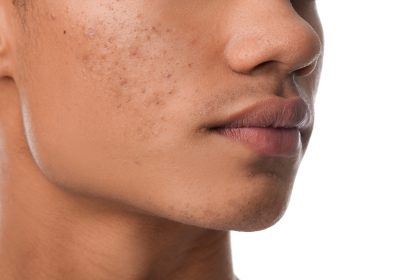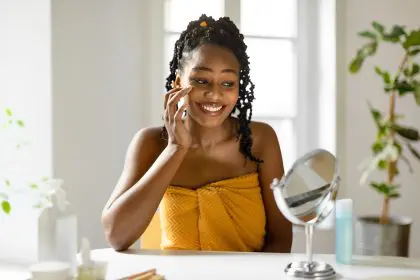In the realm of skincare, sunscreen often takes center stage. However, there is a common misconception that individuals with darker skin tones are immune to the harmful effects of the sun’s ultraviolet (UV) rays. This myth can lead to a dangerous neglect of sun protection, increasing the risk of skin cancer among Black individuals. Despite the natural melanin in Black skin providing some protection against UV radiation, it is insufficient to prevent skin damage or cancer completely. Understanding the importance of sunscreen for Black skin is crucial for maintaining skin health and reducing the risk of skin cancer.
The myth of natural protection
Melanin, the pigment that gives skin its color, does offer some protection against the sun’s harmful rays. It absorbs and dissipates UV radiation more effectively than lighter skin tones, so Black skin tends to burn less quickly. However, this does not mean Black skin is immune to UV damage. The protection provided by melanin is roughly equivalent to SPF 13, which is far below the recommended SPF 30 for adequate sun protection.
Neglecting sunscreen can lead to various forms of sun damage, including premature aging, hyperpigmentation, and, most concerningly, skin cancer. The notion that black people do not need sunscreen is a dangerous myth that needs to be dispelled to protect skin health effectively.
Understanding UV radiation and its effects
Two types of UV radiation affect the skin: UVA and UVB rays. UVA rays penetrate deep into the skin and contribute to aging and long-term damage, while UVB rays are primarily responsible for sunburn and direct DNA damage that can lead to skin cancer. Both types of UV rays are harmful and can lead to severe skin conditions, including cancer, regardless of skin color.
Studies have shown that while Black individuals are less likely to develop melanoma, the most severe type of skin cancer, they are more likely to be diagnosed at a later stage, which can lead to worse outcomes. This delay in diagnosis is often due to the misconception that Black skin is invulnerable to sun damage, resulting in less frequent skin checks and lower awareness of the signs of skin cancer.
Types of skin cancer in Black skin
Skin cancer can manifest differently in Black skin compared to lighter skin tones. The most common types of skin cancer in Black individuals are squamous cell carcinoma and acral lentiginous melanoma (ALM). Squamous cell carcinoma often appears in areas not typically exposed to the sun, such as the legs, and can be linked to chronic inflammation or scarring. ALM, on the other hand, occurs on the palms, soles of the feet, and under the nails. Both types of cancer can be aggressive if not detected and treated early.
The late diagnosis and treatment of skin cancer in Black individuals underscore the importance of regular skin examinations and sun protection. Awareness and education about the signs of skin cancer and the importance of sunscreen use are crucial steps in improving outcomes and reducing the risk of severe skin conditions.
The role of sunscreen in prevention
Sunscreen is vital in preventing sun damage and reducing the risk of skin cancer. It works by absorbing or reflecting UV radiation, preventing it from penetrating the skin and causing damage. For Black skin, using a broad-spectrum sunscreen that protects against UVA and UVB rays is essential.
Broad-spectrum sunscreens are formulated to protect against both types of UV radiation, offering comprehensive protection. Applying sunscreen daily, even on cloudy days or when indoors near windows, can significantly reduce the risk of sun damage and skin cancer. It’s also important to reapply sunscreen every two hours when outdoors and after swimming or sweating.
Choosing the right sunscreen
When selecting a sunscreen, individuals with black skin should consider several factors to ensure effective protection and comfort. Look for sunscreens that are:
- Broad-spectrum: Protects against both UVA and UVB rays.
- SPF 30 or higher: Provides adequate protection against UV radiation.
- Non-comedogenic: Does not clog pores, reducing the risk of acne and breakouts.
- Moisturizing: Helps maintain skin hydration, which is important for overall skin health.
Additionally, modern sunscreens come in various formulations, including lotions, gels, and sprays, making finding a product that suits individual preferences and skin types easier. For those concerned about the white cast that some sunscreens can leave on darker skin, many options are now available that are specifically designed to be invisible or blend seamlessly with black skin tones.
Overcoming barriers to sunscreen use
Despite the clear benefits of sunscreen, there are several barriers to its widespread use among black individuals. These include:
- Lack of awareness: Many people are not aware of the risks of sun damage and skin cancer for black skin.
- Cultural myths: The persistent belief that black skin does not need sunscreen can lead to neglect of sun protection.
- Product availability: Historically, fewer sunscreen products have been formulated for darker skin tones, though this is changing with increased demand and awareness.
- Texture and appearance: Concerns about the feel and look of sunscreen on the skin can deter regular use. However, advancements in sunscreen formulations have addressed these issues, making products more user-friendly for all skin types.
Education and outreach are key to overcoming these barriers. Healthcare providers, community leaders, and the media can play a significant role in spreading awareness about the importance of sunscreen for Black skin and dispelling harmful myths.
By prioritizing sun protection and spreading awareness, we can ensure that everyone, regardless of skin color, is equipped to protect their skin and enjoy the sun safely.
This story was created using AI technology.
















